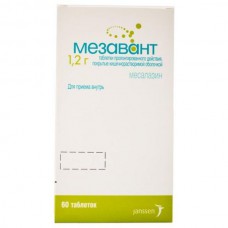Expiration date: 12/2026
The composition and form of issue
Mezavant extended-release tablets, enteric coated
1 tab. contains mesalazine 1200 mg, in a package of 60 pieces
Pharmacological action:
Mezavant has local anti-inflammatory (due to inhibition of the activity of neutrophil lipoxygenase and the synthesis of Pg and leukotrienes). Inhibits migration, degranulation, phagocytosis of neutrophils and the secretion of Ig by lymphocytes. Has antibacterial activity against Escherichia coli and some cocci (manifested in the large intestine).
Has an antioxidant effect (due to the ability to bind to free oxygen radicals and destroy them). Has good portability, reduces the risk of relapse in Crohn's disease, especially in patients with ileitis and long duration of the disease.
Indications:
Ulcerative colitis, Crohn's disease (prevention and treatment of exacerbations).
Contraindications:
Hypersensitivity (when using enemas, including methyl - and propylparaben), peptic ulcer and 12 duodenal ulcer, hemorrhagic diathesis, severe renal/hepatic insufficiency, during lactation, the last 2-4 weeks of pregnancy, children's age (up to 2 years).
With caution. Pregnancy (I trimester), liver and/or kidney failure, the deficit glukozo-6-fosfatdegidrogenaza.
Method of application and doses
During exacerbation of the disease - 400-800 mg 3 times a day, for 8-12 weeks. Prevention of relapse - 400-500 mg 3 times a day for ulcerative colitis and 1 g 4 times a day for Crohn's disease, children older than 2 years - 20-30 mg/kg/day in divided doses, for several years. In severe disease daily dose may be increased to 3-4 g, but not more than 8-12 weeks. Tablets should be taken whole without chewing, after eating, squeezed more liquid.
Children candles administered: in acute - 40-60 mg/kg/day for maintenance therapy: 20-30 mg/kg/day.
Side effects:
From the digestive system: nausea, vomiting, heartburn, diarrhea, loss of appetite, abdominal pain, increased activity "liver" transaminases, hepatitis, pancreatitis.
From the CCC: palpitations, tachycardia, increase or decrease in blood pressure, chest pain, shortness of breath.
From the nervous system: headache, tinnitus, dizziness, polyneuropathy, tremor, depression.
From the urinary system: proteinuria, hematuria, oliguria, anuria, crystalluria, nephrotic syndrome.
Allergic reactions: skin rash, pruritus, dermatitis, bronchospasm.
On the part of the blood: anemia (hemolytic, megaloblastic, aplastic), leukopenia, agranulocytosis, thrombocytopenia, hypoprothrombinemia.
Other: weakness, mumps, photosensitivity, volchanochnopodobny syndrome, oligospermia, alopecia, reduction of slezna liquid.
Special instructions:
Appropriate regular holding of General blood analysis (before, during, and after treatment) and urine, control of excretory function of the kidneys. Patients who are "slow acetylators" have an increased risk of side effects. There may be urine staining and tears in the yellow-orange color, the painting of soft contact lenses. In the case of pass receiving medication missed dose should be taken at any time or together with the next dose. If you skipped several doses, continuing treatment, consult a doctor. If you suspect the development of acute intolerance syndrome mesalazine should be abolished.
Drug interactions
Enhances hypoglycemic effect of sulfonylureas, ulzerogennosti corticosteroids, methotrexate toxicity, reduces the activity of furosemide, spironolactone, sulfonamides, rifampicin, increases the effects of anticoagulants, increases the effectiveness of uricosuric drugs (blockers kanalzeva secreta). Slows the absorption of cyanocobalamin.
Overdose:
Symptoms: nausea, vomiting, gastralgia, weakness, drowsiness.
Treatment: gastric lavage, the appointment of laxatives, symptomatic therapy.


